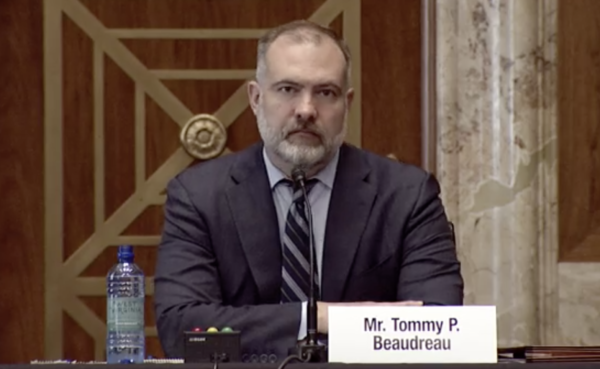The Senate easily confirmed former Obama administration official Tommy Beaudreau as deputy secretary at the Interior Department on Thursday, a rare bipartisan moment in an increasingly bitter fight over President Joe Biden’s policies on energy production and climate change.

Beaudreau, a lawyer and former Interior chief of staff, is widely seen as a moderate and was selected in April after Biden dropped plans for a more liberal nominee who faced key Senate opposition.
His nomination was approved on an 88-9 vote. Forty-one Republicans supported Beaudreau, along with 47 Democrats.
Beaudreau grew up in Alaska and is politically close to the state’s senior senator, Republican Lisa Murkowski, a former chair of the Senate Energy and Natural Resources Committee who holds great sway over oil drilling, endangered species and other issues. Murkowski and West Virginia Sen. Joe Manchin, a moderate Democrat who now heads the energy committee, said they were concerned that Biden’s initial choice, Elizabeth Klein, was overly hostile to fossil fuels.
The two lawmakers told the White House that Klein, a progressive who is a favorite of environmental groups, would not be a sufficient counterweight to Interior Secretary Deb Haaland, a former Democratic congresswoman from New Mexico who has criticized the oil and gas fuel industry.
Haaland was confirmed on a narrow 51-40 vote in March, becoming the first Native American to lead a Cabinet agency.
Wyoming Sen. John Barrasso, the top Republican on the Senate energy panel, said he has been impressed with Beaudreau, who was the first director of the Bureau of Ocean Energy Management, an agency created to oversee offshore drilling following the disastrous BP oil spill in the Gulf of Mexico in 2010.
“It’s clear Mr. Beaudreau understands America’s need for an all-of-the-above energy strategy,″ Barrasso said, adding that he hopes Beaudreau “can serve as a voice of reason in an administration that is waging a war on American energy workers.″
Murkowski, who was one of just four GOP senators to back Haaland, had made no secret of her support for Beaudreau, citing his Alaska background and knowledge of Interior Department issues.
“Tommy Beaudreau was raised in Alaska and understands the importance of oil and gas programs and their impacts on the communities and families that live there,″ she said in a statement Thursday.
“Alaska has been off to a rough start” with the Biden administration, Murkowski said, adding that Beaudreau “has a reputation for listening to all sides on an issue, and I hope to count on him to help improve Alaska’s relationship with the Interior Department.″
Manchin also praised Beaudreau, saying he understands Interior’s “dual mission of preserving and protecting our national parks and public lands and providing a large part of the energy and mineral resources that we need to power the nation.″
Interior has emerged as a flashpoint in the early days of the Biden administration, with Republicans frequently complaining that Biden’s policies hurt energy production and jobs. Most Democrats support those same policies as necessary to combat climate change and encourage conservation of public lands.
The conflict came to a head this week as a federal judge blocked Biden’s suspension of new oil and gas leases on federal lands and waters, a move GOP lawmakers hailed as overdue. Haaland said her department is reviewing the judge’s opinion and consulting with the Justice Department.
Beaudreau’s nomination was widely seen as an attempt by Biden to win favor with Murkowski, Manchin and other moderates who are vital to a host of Biden’s priorities, including his sweeping infrastructure and clean energy package.
The overwhelming vote for Beaudreau comes as Biden’s nominee to oversee federal lands in the West faces Republican pressure to withdraw over her ties to environmental activists convicted of trying to sabotage a national forest timber sale more than 30 years ago.
Tracy Stone-Manning, nominated to lead Interior’s Bureau of Land Management, should be disqualified over her collaboration with “extreme environmental activists,” Barrasso said.
As a 23-year-old graduate student at the University of Montana, Stone-Manning sent a letter to federal officials in 1989 saying spikes had been inserted into trees in Idaho’s Clearwater National Forest. The profanity-laced letter warned “a lot of people could get hurt” if logging proceeded, according to court documents obtained by The Associated Press from federal archives.
Spiking trees involves inserting metal or ceramic rods into trunks so they can’t be safely cut down, and the tactic has sometimes been used to halt timber sales.
Stone-Manning testified against two friends who were convicted in the case. She was granted immunity and was never charged with any crime.
Stone-Manning did not respond to telephone and text messages last week seeking comment. An administration official who wasn’t authorized to comment publicly and spoke on condition of anonymity said officials knew about the criminal case and Stone-Manning’s testimony prior to her nomination.
___
Associated Press writer Matthew Brown in Billings, Mont., contributed to this report.




